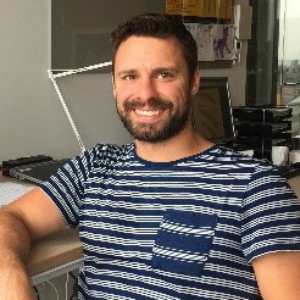
Career progression
1. Biomedical Science BSc
2. Research technician
3. PhD
4. One year postdoc
5. Academia
Thomas is an assistant professor at the Biomedicinsk Institut and a Carlsberg Foundation Fellow.
What is your career pathway to date (including your education)?
Biomedical Science BSc at St. George’s, University of London; six months as a technician at St. George’s, University of London; PhD in Vascular physiology and pharmacology with Prof. Iain Greenwood at St. George’s, University of London. I then moved to the University of Copenhagen, Denmark for a 1-year postdoc, after which I received a Marie Curie COPFUND Fellowship to work on ion channel regulation in vascular smooth muscle, also at the University of Copenhagen (two years). I also received a Lundbeck Fellowship, which ran alongside my Marie Curie Fellowship (two years).
I am currently a Carlsberg Fellow and Assistant Professor at Copenhagen University working on microtubules in the vasculature, and teaching medical students.
What do you do? What does a typical week look like to you?
Every week is different. Some weeks during term-time are extremely busy with teaching. For instance, I might teach 4-7 hours every day of the week for about 3 weeks on acute blood pressure changes when this course is running. Normally, I will teach 2 classroom hours each week throughout term-time.
In between teaching, I do a lot of research in the lab looking at how blood vessels contract and relax and creating new protocols to discover new aspects of physiology yet to be determined. I also supervise students in the lab.
I spend more and more time writing grants, writing papers, reviewing papers for various journals and performing general laboratory administration, such as organising laboratory meetings, cleaning rotas etc.
What do you like and dislike the most about your current position?
Likes: Being at the cutting edge of human knowledge and pushing those boundaries with my research, which coincides with getting papers accepted, and that is always a great feeling.
Dislikes: Administrative duties are increasing and there is little support to get these done. I also dislike needing to write grants for my own salary every other year just to maintain employment, as the university structure in Denmark does not employ researchers/lecturers until much later in their careers, unlike in the UK.
How do you see your career further progressing in the future?
Having recently become assistant professor, but still sourcing my own salary from grant money, I hope to progress to associate professor and be employed by the university. This will allow me to write more focused grants to employ researchers and ultimately obtain a truly independent laboratory.
What three pieces of advice would you give someone keen on developing a career in your area of work?
Move abroad. It does not have to be forever, maybe just for a postdoc or for 6 months of your PhD. Having international experience of new techniques and different labs always looks good.
Surround yourself with the right people. As in all occupations, there are people who want to help you and those that just want to help themselves. Early in your career it helps to identify those that care about your career development and will help introduce you to the right people.
Following on from the above point – network. Go to conferences and seminars and speak to people. Creating a network for yourself will help you throughout your career.